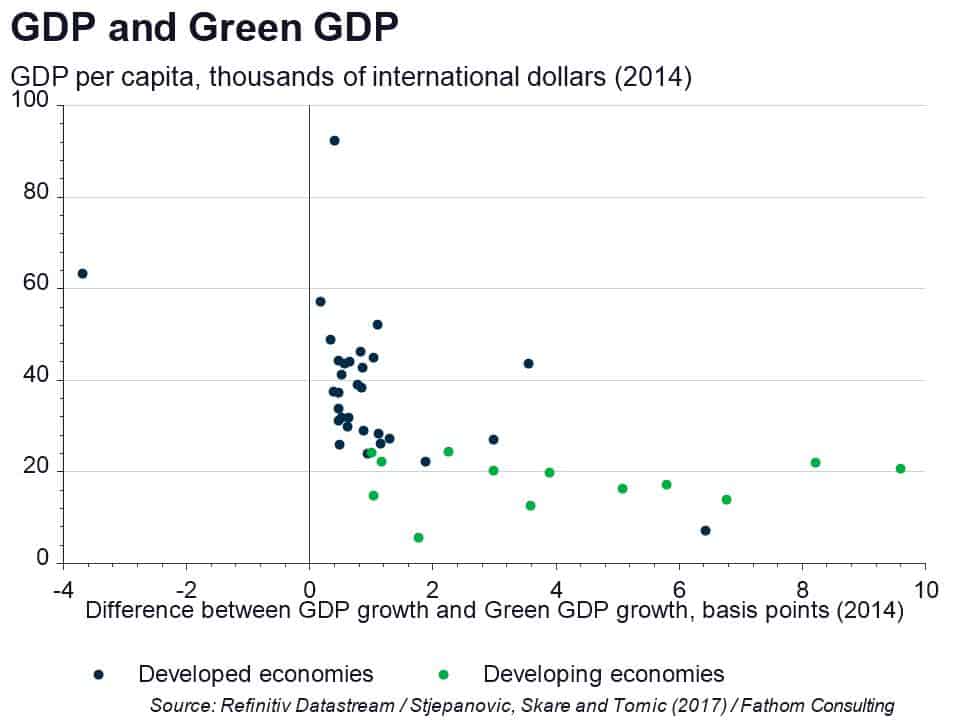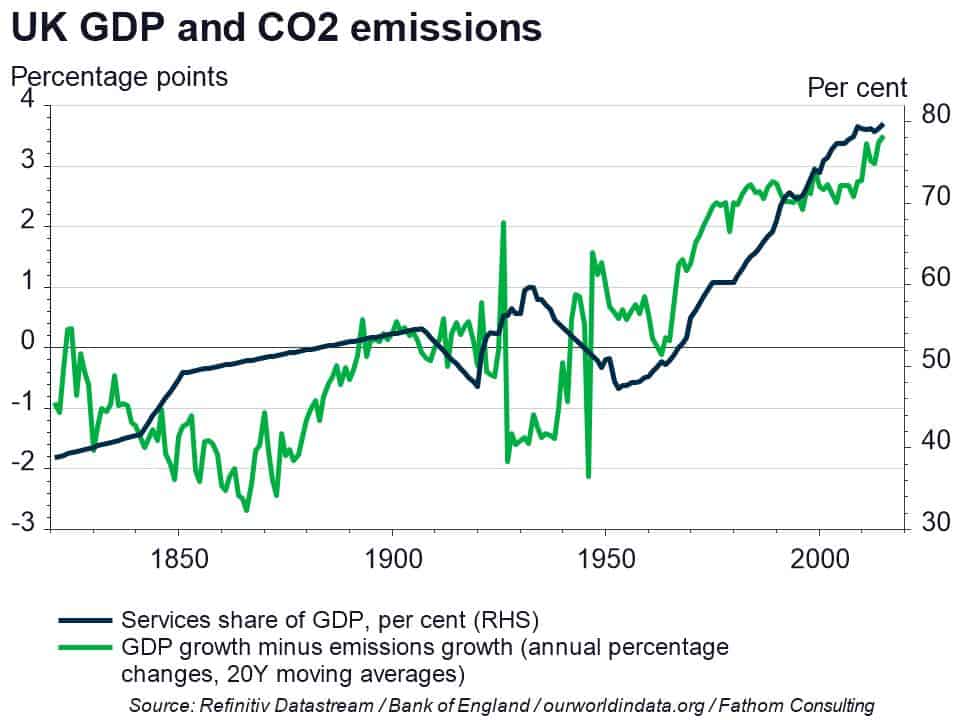
This article is a re-post from Fathom Consulting's Thank Fathom its Friday: "A sideways look at economics". It is here with permission
The debate around climate change, and what actions governments, the private sector and households ought to take is being thrust ever more into the public eye.
Earlier this year ‘Extinction Rebellion’ protests demanding ‘emergency’ action disrupted central London - although arguably not as much as this week’s ‘heatwave’, which once again exposed the UK’s infamous struggles with inclement weather.
But with temperature records set in many European cities, it highlighted a longer-term trend towards a warming planet. The climate debate continues to rage on. For its part, the UK has one of the most ambitious climate targets in the world, aiming to reduce net carbon emissions to zero by 2050. Evidence suggests an advanced economy such as the UK’s should find it easier to achieve that goal than a less developed one would.
The idea that environmental damage may be harmful to future productive potential is embodied in the concept of ‘Green GDP’,[1] which attempts to take into consideration social and environmental costs by adjusting GDP downwards by an estimate of resource and environmental depletion. Any such exercise is bound to be subject to significant uncertainties.
In a world of cross-border supply chains and high levels of trade, breaking down the environmental costs of growth in one country will necessarily be no easy task.
Nevertheless, the broad conclusions can be informative. As the chart below shows, the environmental cost of additional economic activity falls as GDP per capita rises. That is, as countries get richer, there’s a smaller difference between official GDP growth and Green GDP growth.

There are a couple of reasons why advanced economies may be able to achieve ‘greener growth’. First, with higher standards of living, governments are generally more willing to sacrifice some GDP in the name of environmentally sustainable policies. The priorities for politicians in emerging economies may be different. Another factor that probably plays a role in this advanced and emerging country dichotomy is the shift of developed economies towards services-based industries (such as economic consultancies) which, generally speaking, are less polluting than manufacturing (even if the throngs of tertiary-sector employees stuck on a filthy tube carriage during rush hour feel inclined to disagree). The chart below shows a clear link between the rise of the services sector in the UK and ‘greener’ UK growth.

While it’s no doubt good news that rich countries are now able to generate ‘greener’ growth, the idea of breaking down the environmental costs at the level of the nation state doesn’t seem appropriate.
For one, as the UK has become more services-intensive, its imports of manufactured goods from emerging markets with less-green growth have increased. If greener growth here can only be achieved at the expense of less-green growth elsewhere, it’s not clear that any environmental benefit in a global sense has been accrued.
In addition, all countries share the same atmosphere and planet; the benefits of more environmentally efficient growth in the UK will not come to an immediate halt at its border.
At the same time, the UK can itself never be entirely protected from environmentally damaging growth elsewhere. That’s what makes problems such as climate change so difficult to solve - it’s a real tragedy of the commons.
True, many emerging economies will eventually transition to greener growth based around services. However, in the long run, it may not just be us, but also the planet that is dead.
[1] Stjepanovic, Skare and Tomic, ‘A new approach to measuring green GDP: a cross-country analysis’ (2017).
Alessia Montinaro is an economist at Fathom Consulting in London, England. This article is a re-post from Fathom Consulting's Thank Fathom its Friday: "A sideways look at economics". It is here with permission
9 Comments
Yes, in the long run the planet is dead so just embrace the inter glacial warming we are lucky enough to live in. Who wants to go back to living in the little ice age anyway? Ice skating on the Thames and starvation is over rated. The planet didn't die at 6000ppm nor will it at 415pm.
The long run:
https://curryja.files.wordpress.com/2018/02/figure-115.png
Glacio-epochs and the supercontinent cycle after ∼ 3.0 Ga: Tectonic boundary conditions for glaciation.
Of all possible factors, variation in atmospheric CO2 appears to be the most poorly correlated with glacio-epochs, at least for the Phanerozoic (Fig. 2). The fundamental timing of glacio-epochs at least over the last 3 Ga appears may be related to celestial drivers such as variation in cosmic ray flux (CRF; Shaviv, 2003) suggesting that glacio-epochs are periodic phenomena.
https://www.sciencedirect.com/science/article/pii/S0031018207005032
Time Interest.co did something about trolls - the paid hack kind.
But we are a long way past having a debate. This is about extinction (ours and species en masse) and about societal collapse. From that perspective, this is a fine article.
Cheer up PDK, the world isn't ending. Try and get out more. "The number of whales spotted in the waters off New York City has increased by 540 percent in the last eight years, according to researchers.
In 2010, experts from non-profit Gotham Whale identified just five whales in local waters across the whole year. However, in 2018, the number of sightings jumped to a staggering 272, the vast majority being humpbacks, Patch reported.
The non-profit says that the recent spike in whale sightings is the result of several successful environmental policies—including the Clean Water Act, the Endangered Species Act and the Marine Mammal Protection Act—as well as a decrease in pollution in the Hudson River."
Paid denial action #1 - put up obfuscating info, trying to muddy the waters. Fred Singer/tobacco is the classic blueprint, he was there in the early Climate Change denial days too...
Paid denial action #2 - put up obfuscating info, ditto (for anyone not getting what I'm pointing out, there will always be a falsehood wrapped up in the emanations of such trolls. All you have to do is work out what. The first has already been well trashed, the second avoids how many whales were present, pre European arrival. Baselines, nothing like them.
Unfortunately, others - through fear perhaps - cling to this type of nonsense. Same type swallowed Elite-peddled 'pie in the sky when they died', historically. Ironically, if they were braver examiners of the truth, there would be no market for trollery.... Same difference (between truth and peddled narrative) is the reason Wikileaks could exist - no difference would mean nothing to leak.......
Here's a look at one of the payment/obfuscation/lobby webs:
https://www.ecori.org/climate-change/2019/1/1/local-and-national-effort…
As I said, do try and get out more. Your conspiracy fantasies are laughable. Try and wean yourself off Kunstler and crackpot catastrophe websites. Have a read of the glaciation paper for instance, and get some perspective.
laughable considering the shear weight of evidence now being presented, really your situation is lost now even ordinary ppl see the changes happening.
The planet is a rock it doesnt care about ppm of CO2, nor heat, humans on the other hand do/will. 100s of thousands dying of heat stroke, crops destroyed, farmland flooded is lost livelihoods as well, yes great outcomes, not.
"One of the deadliest threats posed by the climate crisis is extreme heat. It kills more Americans every year than any other weather-related event."
https://grist.org/article/heres-how-many-heat-deaths-15-cities-could-pr…
"Researchers believe that global warming is already responsible for some 150,000 deaths each year around the world, and fear that the number may well double by 2030 even if we start getting serious about emissions reductions today."
https://www.scientificamerican.com/article/global-warming-and-health/
To be killed by heat you had to be around in the dust bowl era.
ttps://ourworldindata.org/uploads/2017/12/Deaths-by-catastrophe-type.png
Cold is the killer, not heat. Especially with Green mandated energy poverty.
"More temperature-attributable deaths were caused by cold (7·29%, 7·02–7·49) than by heat (0·42%, 0·39–0·44). Extreme cold and hot temperatures were responsible for 0·86% (0·84–0·87) of total mortality."
https://www.thelancet.com/journals/lancet/article/PIIS0140-6736(14)6211…
Yep 0.86% of deaths. Let's crash the global economy and save those people!
For anyone who is bothered, intellectually, to put the truth in perspective (and it relates to the article completely):
https://www.youtube.com/watch?v=HMmChiLZZHg
It'll be the best hour you ever watched.

We welcome your comments below. If you are not already registered, please register to comment
Remember we welcome robust, respectful and insightful debate. We don't welcome abusive or defamatory comments and will de-register those repeatedly making such comments. Our current comment policy is here.